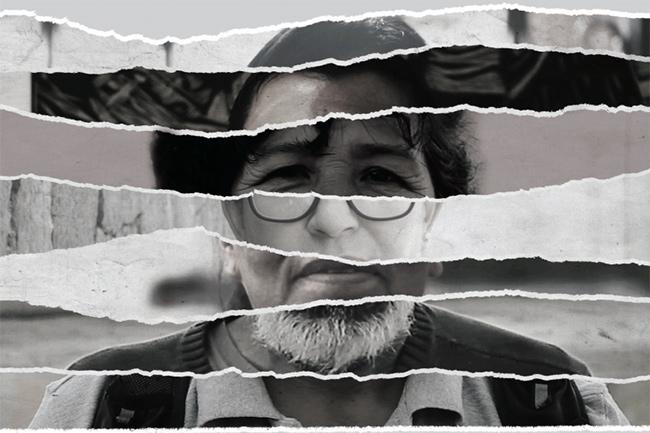A hat lying on the street; a blood puddle. Another journalist was murdered In Mexico: Javier Valdez, the great chronicler of Sinaloa, who would denounce in spite of threats. He was killed in broad daylight. It was a slap to the face of Justice, a warning to all that no one is to forget the might of Narco-violence. Valdez did not allow himself to become intimidated, and he lost in the asymmetrical war of pen versus lead. He lost his life, but the whole of society is losing its soul: without the press, the people are mute and weak. No matter where it is located, a community deprived of its means for communications is bound to dilution, to loss, to forgetting and being forgotten.
The nth mourning prompted reporters to express their anger and to request greater guarantees.
In March alone, Miroslava Breach, Ricardo Monlui, Cecilio Pineda and Armando Arrieta, all journalists, were attacked by hired assassins. Three of them died. The last of the four of them, Armando Arrieta, is hospitalized, in serious condition.
Miroslava Breach was a correspondent in Chihuahua, in the north of the country, for the newspapers La Jornada and Norte de Ciudad Juarez. She was killed while leaving home to take her son to school. One of her last reports told of peasants displaced from the mountains and forced to plant poppies for the «narcos». In another report, quite possibly her ticket to death, she denounced that “Candidates to run for councilmen in Chihuahua are imposed by organized Crime». She was denouncing that the names of members of organized crime were being included in the lists of the PRI and the PAN, the two main parties in the country, as candidates running for councilmen.
Ricardo Monlui, from Córdoba, in the state of Veracruz, was the author of «Crisol», a column he published in «El Sol de Córdoba» and in different media in Xalapa. He was also director of «El Político», and owner of the digital portal «elpolitico.com.mx».
Cecilio Pineda, in the southern state of Guerrero, served as a reporter for the newspaper “El Debate de los Calentanos”. In his notes, he denounced the links of councilmen of the region of Tierra Caliente with organized- crime groups.
Arrieta Granados, also from Veracruz, is editor of the newspaper «La Opinión», of Poza Rica, and professor at the Universidad Veracruzana. He was attacked when he arrived home after the closing of the newspaper.
Journalists exercising their profession far from the capital are the ones threatened and murdered. Their deaths have a devastating effect on other communicators, who retreat into silence. After 27 years, «Norte de Ciudad Juárez” announced the ending of its printed edition, due to the insecurity of its journalists and the lack of guarantees for carrying out their work.
In his farewell article, Oscar A. Cantú Murguía, owner of the newspaper, wrote: «Dear reader, I am writing to inform you that I have taken the decision to close this morning-paper, among other things, because there are no guarantees or safety for the exercise of critical counterweight journalism».
While the Mexican situation is particularly serious, it is important to stress that freedom of the press is threatened in almost all of Latin America and in many countries in the Caribbean.
César Miguel Rondón, one of the most serious and important journalists of Venezuela, was arrested a few days ago at the airport, where he had gone with his wife. They took both of their passports and prevented them from boarding the plane. Shortly before that, President Maduro had pointed at him by first and last name, saying that he should be in jail. The number of journalists beaten as they cover demonstrations and marches throughout the country is every day larger. In 2016, the Inter American Press Association denounced 123 acts of intimidation against journalists and national and international media. Between 2013 and 2015, Venezuelan courts have opened against journalists, for alleged defamation and libel crimes, 29 investigations.
According to the dossier prepared by «Reporteros sin Fronteras», El Salvador is the country in the region where freedom of the press is most at risk; the cause being the cartels’ violence coupled with President Salvador Sánchez Cerén’s confrontation with the media, whom he accused of participating in a «Campaign of psychological terror» against his government.
In many Latin American and Caribbean countries, freedom of the press mutilation derives from governments that seek to perpetuate themselves in power, and who need not only to silence any criticism but to prevent citizens from receiving data and information that allow them to form their own criteria. In other countries, threats stem from institutional degradation, from impunity, and from the strength of criminal organizations.
A happy exception among the nations of Latin America and the Caribbean is Costa Rica. It is placed within the top ten countries worldwide, in terms of freedom of the press. According to the analysis of Reporteros sin Fronteras, Costa Rica has a very favorable legislation for the press and a true recognition of the journalistic profession.
The ills that, as we have seen, afflict the free press in Latin America are also found in the United States and in many other parts of the world.
The rise of a new populism goes hand in hand with the need to silence the free press. Leaders who want to be perceived as defenders of the rights of the underprivileged, who base their power on promise and threat, cannot deal with a free press capable of detecting and showing the seams in their performance and the emptiness of their speech.
Photo Credits: Portada del informe Libertades en resistencia de Artículo 19


